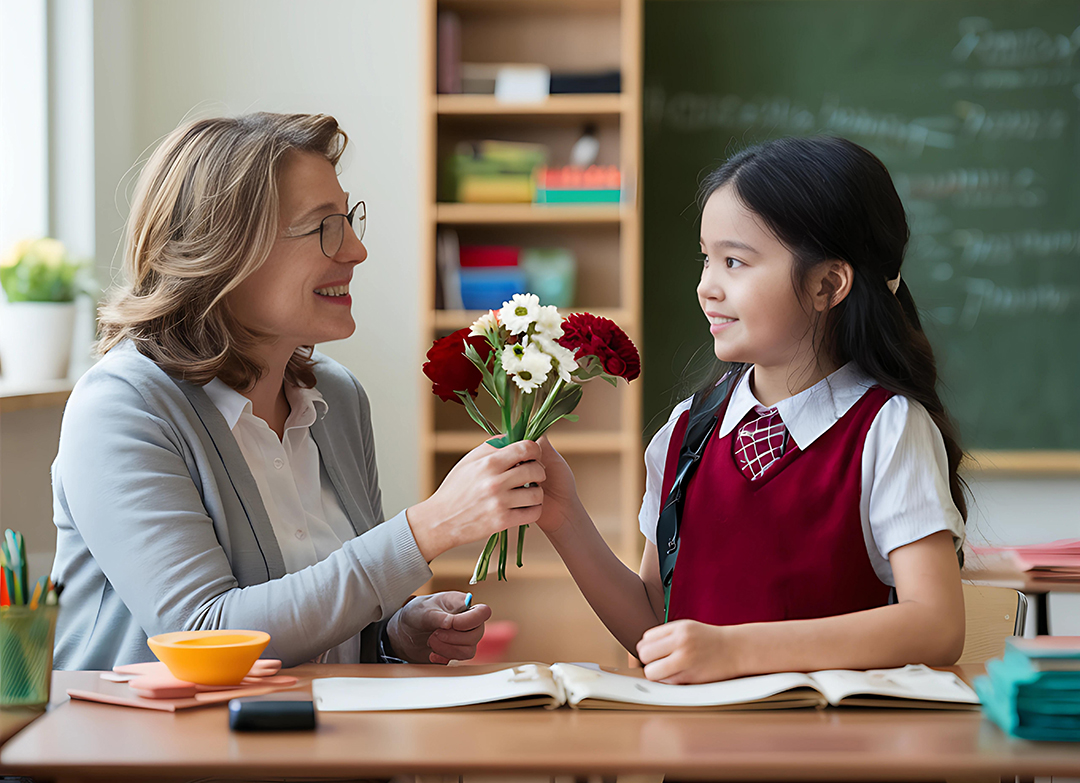Respect for teachers is one of the most fundamental moral values in any educational system. In the past, a teacher was not only an instructor but also a model of humane and spiritual behavior. Although the form of education has changed in today’s world, respect for teachers remains the foundation of effective relationships between students, families, and schools. This article explores the role of respect in moral development, ways to teach it through play and daily behavior, and its impact on children’s character growth.
What Does Respect for a Teacher Mean?
Respect is not limited to words; it is reflected in behavior, tone of speech, active listening, and appreciating the teacher’s efforts. A child who respects their teacher shows an understanding of the value of knowledge, order, and responsibility.
-
Respect means listening without interrupting.
-
Respect means appreciating the teacher’s efforts—even with a simple smile.
-
Respect means following class rules and participating actively in learning.
The Role of Respect in a Child’s Moral and Social Development
Respecting teachers lays the foundation for learning to respect others in society. At school, children learn that every role is valuable—from teachers and principals to classmates and school staff.
Educational benefits of respecting teachers:
-
Strengthening internal discipline and responsibility
-
Creating trust and emotional safety in the school environment
-
Increasing motivation for learning
-
Developing polite and socially appropriate behavior
The Role of Parents in Teaching Respect for Teachers
Parents are a child’s first teachers. If they demonstrate respectful behavior at home, children naturally repeat the same behaviors at school. When parents speak positively and gratefully about teachers, children adopt similar attitudes.
Simple ways parents can teach respect:
-
Speak respectfully about teachers in the presence of children
-
Maintain positive, polite communication during school meetings
-
Discuss the teacher’s efforts at home and encourage gratitude
Teaching Respect Through Play
Play is a highly effective tool for transmitting moral values. Children learn cooperation, listening, and rule-following through games. Below are some activities that indirectly teach the concept of respect.
1. “Respect in Action”
Students act out scenarios involving disrespect (such as interrupting or mocking others) and then practice the correct behavior.
Goal: Understanding respectful behavior in real classroom situations.
2. “Golden Listener”
One child speaks while the other listens without reacting until the end.
Goal: Teaching active listening and respecting others’ speech.
3. “Gratitude Chain”
Children sit in a circle and thank the next person for something.
Goal: Strengthening appreciation and mutual respect.
Respect in Everyday Life
Respect for teachers is not limited to school; daily behavior at home and in the community also reflects a child’s upbringing.
Examples of indirect respect-learning:
-
Thanking parents, friends, and teachers in simple situations
-
Using polite expressions such as “please,” “thank you,” and “excuse me”
-
Accepting differences and listening to others’ opinions
The Teacher’s Role in Modeling Respect
Respect is mutual. A teacher who treats students with kindness, patience, and fairness teaches respect through action. When a child is addressed respectfully, they learn to respond similarly.
Strategies for teachers:
-
Use a calm, positive tone even when correcting behavior
-
Encourage mutual respect among students
-
Discuss the concept of respect as part of class activities
Frequently Asked Questions About Teaching Respect
How can we encourage genuine—not superficial—respect?
Through modeling. When children observe adults respecting one another, they learn respect through understanding, not force.
Should respect only be for teachers?
No, respect should be present in all relationships. However, teachers hold a special place because of their educational role.
What is the best response if a child shows disrespect?
Instead of punishment, talk to the child to understand the cause. Sometimes tiredness, anxiety, or lack of attention leads to disrespectful behavior.
Respect and Play: A Combined Educational Approach
Combining respect with play makes learning deeper. In play, children feel free and more able to understand values. Group games such as “Cooperation Circle” or “Respect in Action” are effective ways to teach moral lessons indirectly.
Conclusion
Respect for teachers is rooted in a society’s culture and values. It is not merely a form of politeness but a foundation for character growth, responsibility, and humanity. When parents and teachers keep the value of respect alive through their actions, children naturally integrate it into their identity. Remember: moral education begins not with words, but with behavior.







